 Petzlover
Petzlover LaPerm is originated from United States but Manx is originated from United Kingdom. Both LaPerm and Manx are having almost same weight. Both LaPerm and Manx has same life span. Both LaPerm and Manx has same litter size. Both LaPerm and Manx requires Low Maintenance.
LaPerm is originated from United States but Manx is originated from United Kingdom. Both LaPerm and Manx are having almost same weight. Both LaPerm and Manx has same life span. Both LaPerm and Manx has same litter size. Both LaPerm and Manx requires Low Maintenance.
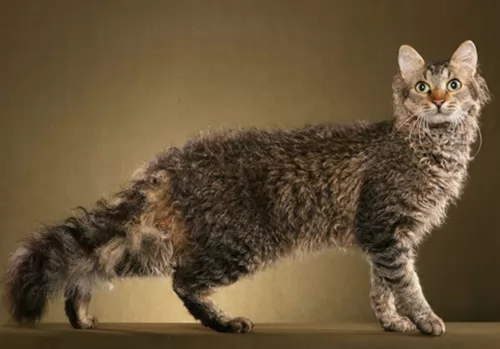 The LaPerm cat hails from the United States of America but you’ll find him in many other countries around the world.
The LaPerm cat hails from the United States of America but you’ll find him in many other countries around the world.
The cat has a dominant gene which results in the unusual curly coat of the cat. This means he is part of the rex breed. This is a term given for the naturally occurring genetic mutation that gives the cat its wavy coat.
It’s not an old cat breed this and it seems to have come about in the early 1980s for the purposes of controlling rodents. The breed founders were Linda and Richard Koehl from Oregon. They started a formal breeding program and the breed was named after their curly coat.
After the cats got the name LaPerm, it was in 2002 that they got recognition from the Cat Fanciers Association.
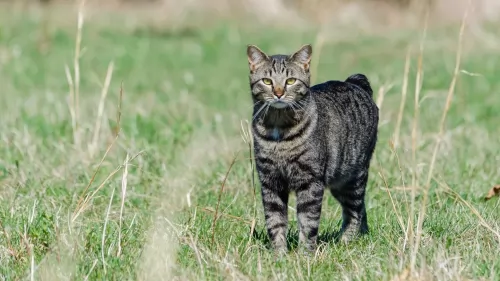 The Manx cat is a domestic cat originating on the Isle of Man, with a short tail. It is one of the oldest cat breeds.
The Manx cat is a domestic cat originating on the Isle of Man, with a short tail. It is one of the oldest cat breeds.
The cat is actually known as being a tailless cat. This is the cat's most distinguishing feature. They've been seen at cat shows since the 1800s.
These cats are descended from mainland stock, whose origins are unknown. It is said these cats are descended from the African wildcat.
The Manx is recognized by the Cat Fanciers Association as well as other cat associations.
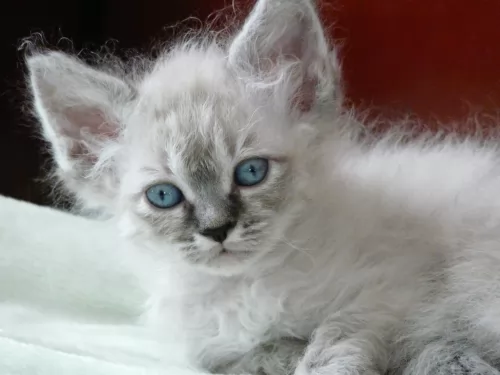 The LaPerm is a medium-sized cat that can weigh anything between 3 and 7kg. They’ve got an athletic build. The legs and the neck are fairly long.
The LaPerm is a medium-sized cat that can weigh anything between 3 and 7kg. They’ve got an athletic build. The legs and the neck are fairly long.
It is thought that they are more hypoallergenic than many other cats but no cat is truly hypoallergenic. The coat is the cat's most exceptional feature, with loose curls. The coat can be long or short. All colors and patterns are acceptable, with red, tabby, and tortoiseshell being more common.
There is no undercoat. The eyes of the cat are medium-sized and almond-shaped.
These are affectionate cats with an outgoing personality. He has a sense of humor so becomes an entertaining cat.
He gets on well with children in the home. People who have owned the cat describe him as clownish. He is playful and that means providing him with some interesting toys.
It’s an intelligent cat and learns to use his paws to open doors and tap you to take notice. He is also fairly active and will willingly retrieve small balls. He is gentle, loving, quiet, and affectionate towards his human family.
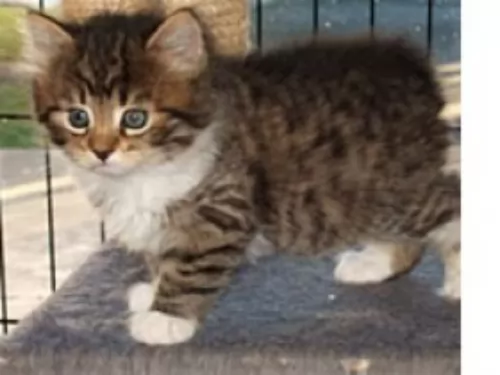 The Manx cat is a medium-sized cat with a stocky, muscular, heavy build. He can weigh between 3 and 6kg. Manx cats come in all coat colors and patterns.
The Manx cat is a medium-sized cat with a stocky, muscular, heavy build. He can weigh between 3 and 6kg. Manx cats come in all coat colors and patterns.
The coat of the cat can be short or long. The long-haired variety is considered its own breed. The cat has always been popular for helping farmers keep rodents under control.
Besides taillessness, the Manx is described as a round cat and its head is round too. The back legs of the cat are much longer than the forelegs.
The eyes of this cat are large and round and can be in different colors such as green, gold, copper, brown, or yellow.
They are very playful and intelligent cats who are devoted to their families. They can easily learn tricks and he can even be taught to walk on a leash.
They’re cats that love to jump and they’re active, playful cats. Don’t be surprised if you see him playing with the water in his water bowl as he is a cat fond of playing in water.
These cats are thought to be dog-like as they’re capable of becoming devoted to their human family. They also have a great sense of humor and they become very entertaining. Children love them as they’re so playful and they in turn get on well with children. When you have a Manx cat in your house, there is never a dull moment.
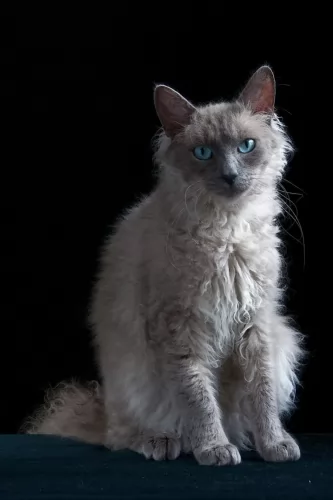 The LaPerm cat is known for its loyal, loving personality. It’s a cat that thrives on being involved with its human family and can easily turn into a lap-cat.
The LaPerm cat is known for its loyal, loving personality. It’s a cat that thrives on being involved with its human family and can easily turn into a lap-cat.
They’re active and also intelligent, and will love you to play some games with him. He will become quite vocal when he demands your attention.
Provide him with a climbing tree as he is active and loves to climb where he can survey the room and decide which human being’s lap he has in mind.
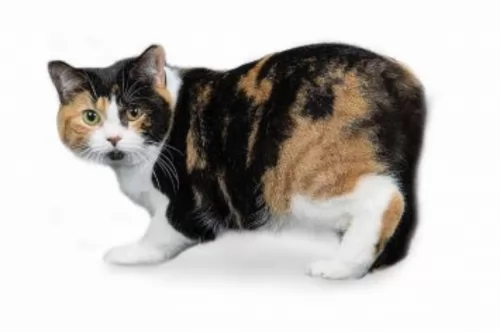 The loving Manx cat is such an even-tempered cat as well and wants to get along well with its entire human family. You can be sure of many years of affection and companionship from this cat.
The loving Manx cat is such an even-tempered cat as well and wants to get along well with its entire human family. You can be sure of many years of affection and companionship from this cat.
It’s a cat that is fairly placid but it still loves to run and play, It’s an amusing cat too and to round everything off it also has a strange way of walking and running.
Give the Manx cat a warm. Loving home and you’ll quickly discover why the Manx cat is such a popular companion cat for so many people. The Manx is such a social, family orientated cat and you shouldn't bring him into your home if you don't have plenty of time for him.
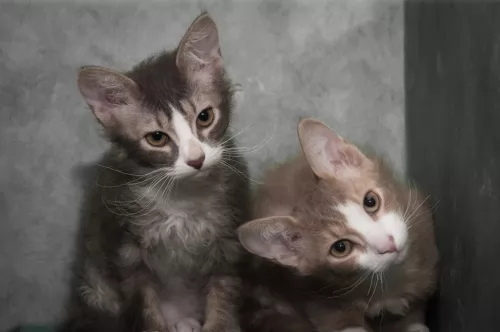 La Perms are generally healthy cats. However, any cat owner needs to recognize the signs of some of the common cat illnesses there are.
La Perms are generally healthy cats. However, any cat owner needs to recognize the signs of some of the common cat illnesses there are.
Cancer, feline immunodeficiency virus, diabetes, and heartworm are all diseases that your healthy cat can at some time succumb too.
Keep an eye on your furry friend, and if he is lethargic and no longer his happy self, get him to the vet immediately for a check-up.
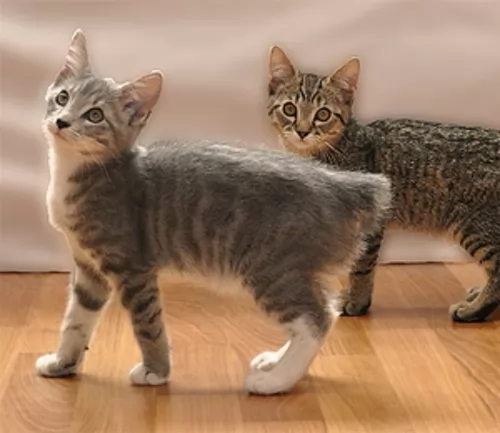 The absence of a tail with the Manx cat is believed to be a genetic defect and because of the spine that looks deformed, it is thought that this would cause the cat problems.
The absence of a tail with the Manx cat is believed to be a genetic defect and because of the spine that looks deformed, it is thought that this would cause the cat problems.
Arthritis can set in early with the Manx cat. Arthritis or osteoarthritis affects many cats and the signs of arthritis in a cat can actually be subtle. The disease can go undetected. Arthritis is about wear and tear in the joints, although other factors such as injury, infection and genetic makeup come into play as well. Arthritis can affect one or more joints in the body such as the hips, elbows ad spine.
The mutant gene that causes the taillessness in this cat may also be responsible for other skeletal deformities in the Manx cat. As a round-shaped cat, the Manx cat can also battle with bladder control.
These ailments are just possibilities with this cat breed and it is more than likely that your Manx cat will never have any one of these diseases.
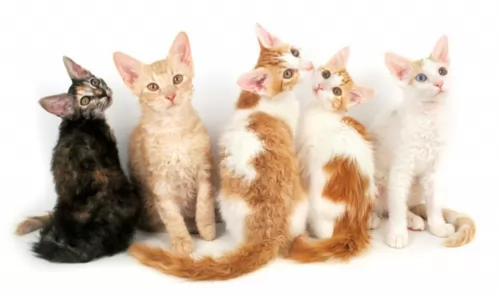 The LaPerm’s unusual coat is easy to care for as it isn’t a big shedder. You’d think that the curls would tangle but they don’t. You can gently comb or brush the curls once or twice a week. Just like with a human perm, you can mist the cat’s curls and comb and fluff them out with your fingers.
The LaPerm’s unusual coat is easy to care for as it isn’t a big shedder. You’d think that the curls would tangle but they don’t. You can gently comb or brush the curls once or twice a week. Just like with a human perm, you can mist the cat’s curls and comb and fluff them out with your fingers.
Cats are particularly prone to periodontal disease, so look into your cat’s mouth occasionally to see that the teeth are as they should be. Brushing the teeth can stress a cat out and make it miserable and the dry cat foods help to keep the teeth clean.
Pet groomers and the vet can check out the teeth for you and make sure they are in tip-top condition.
Make sure your cat’s eyes are clear and bright and free of discharge. Trim the nails as required – something the vet or the pet groomers can also do for you.
Provide your LaPerm with a litterbox and keep it spotlessly clean, ridding it regularly of the cat’s droppings.
Even though there are excellent commercial cat foods on the market, some cats develop finicky eating habits. Don’t start feeding your cat human foods and snacks to coax him to eat. It can cause a host of digestive problems.
Cats are carnivores and require foods high in protein to remain healthy. A veterinarian will need to examine your cat if he is refusing to eat and is losing weight.
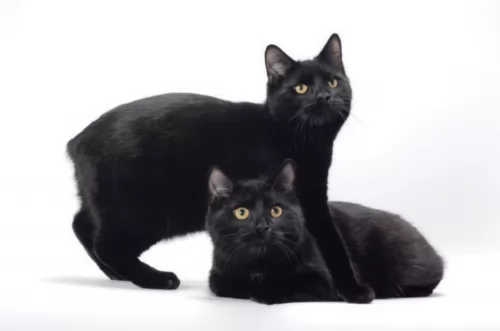 One of the most important caring things that you can do for your cat is to provide him with the best diet there is. The Manx cat requires a balanced diet of protein, vitamins and minerals.
One of the most important caring things that you can do for your cat is to provide him with the best diet there is. The Manx cat requires a balanced diet of protein, vitamins and minerals.
The Manx cat is a carnivore and will need a diet high in protein. Learn to read the labels on the packaging of the commercial cat food, whether wet or dry, and ensure that ingredients such as omega 3 fatty acids and taurine are in the ingredients list.
If you are in any doubt as to what to feed your Manx cat, speak to your vet.
The short coat of the Manx is easily cared for by a brush each week to remove dead, loose hair.
With this tailless cat, you need to check the rear end and perhaps clip the hair short in this area to ensure no feces clinging to the fur surrounding the anus.